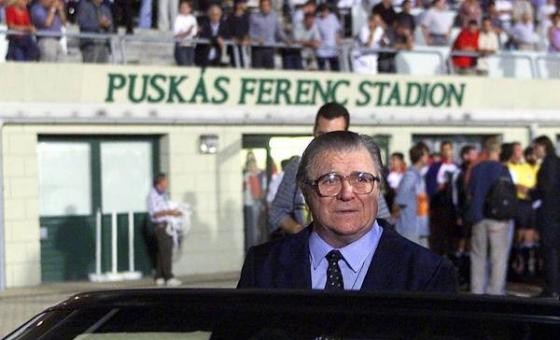PUSKAS.COM
The official website of the most famous Hungarian, one of the greatest footballers of all time
Topical
FERENC PUSKÁS STADION - A SPECIAL BIRTHDAY GIFT FOR 'OCSI BÁCSI'
29 Aug. 2018.
The legendary Népstadion - the home of the Hungarian national team - was named after the most famous Hungarian footballer ever, Ferenc Puskás, on his 75th birthday.
In 2002 a special gift was given to 'Uncle Öcsi'; "Famous footballer Ferenc Puskás is celebrating his 75th birthday by becoming the eponym of the Népstadion, from that moment onwards to be known as the Ferenc Puskás Stadium", announced Gabor Borókai, a spokesman at the Budapest press conference. It was obvious that the home of Hungarian football should be named after its finest, most famous player.
Former world-famous sportspeople and Olympic- and world champions, lobbied the President, Prime Minister, Speaker of the House, the Youth and Sports Minister and the President of the Republic with the initiative, which the government accepted, thus the stadium was renamed the Puskás Ferenc Stadion, the former Honvéd, Real Madrid, Spain and Hungary striker with whom the team maintained an unbeaten run in their country's national stadium, notes an article on the Origo online news portal.
Former world-famous sportspeople and Olympic- and world champions, lobbied the President, Prime Minister, Speaker of the House, the Youth and Sports Minister and the President of the Republic with the initiative, which the government accepted, thus the stadium was renamed the Puskás Ferenc Stadion, the former Honvéd, Real Madrid, Spain and Hungary striker with whom the team maintained an unbeaten run in their country's national stadium, notes an article on the Origo online news portal.
"After the private initiative of our group, it was decided to give the name of Ferenc Puskás to the Népstadion. We feel that this respect for and appreciation of the most outstanding figure in the history of Hungarian football is fully deserved", explained Dezső Ábrahám, the president of the Circle of Friends of Sportspeople.
The Puskás Ferenc Stadium, which was unveiled on 2 April 2002, had already been renovated with a covered press area and an elegant VIP section above the players' tunnel. At the 'Christening' Puskás walked out through a guard of honour made by lines of 75 children onto the pitch where he carried out the ceremonial kick-off in front of a ring of photo journalists. The legendary footballer, who was released from hospital while suffering from a serious degenerative illness, even joked: I'm not in top form right now" On behalf of the aforementioned Circle of Friends of Sportspeople, the organisation's president presented Real Madrid squad picture from 1961, the Hungarian national team's opponents that day (21st August) being none other than their Spanish counterparts, thus Hungary v Spain became the first ever match held at the Ferenc Puskás Stadium.
Prior to that, the 75-year-old former sportsman was awarded a prestigious award from Spain. Former Real Madrid footballer Carlos Blanco, the Director-General of the Supreme Sports Council, presented the Gold Medal of Sporting Merit. In Spain, this is the highest state recognition for sporting activities.
Four years after the celebration, former world-class footballer Puskás died aged 79 years old. The world's farewell to a veritable footballing idol featured the presence of legendary Real Madrid players of the fifties and sixties, Paco Gento and Santamaria (Raymond Kopa and Alfredo Di Stefano could not attend) as well as Franz Beckenbauer, Michel Platini and Sir Bobby Charlton, all of them true greats within football. The running track around the pitch was filled by footballers of NB I and NB II clubs and there were also several prominent figures from domestic football.
'Uncle Öcsi' would not understand why the Hungarian national team cannot currently host guests in a modern national stadium, but work is underway to solve this, a new national stadium sdue to be unveiled next year in time to host four matches in the European Football Championships of 2020.
While everyone is talking about the building of this new Ferenc Puskás Stadium, the name of the venue will be voted for by the public. Knowing the popularity of the captain of the Magical Magyars, one can imagine the stadium in amongst the László Papp Sports Arena and on the site of the old Puskas stadium will be again be named after the country's greatest ever footballer.
Source: Origo/Tamás Juhász












